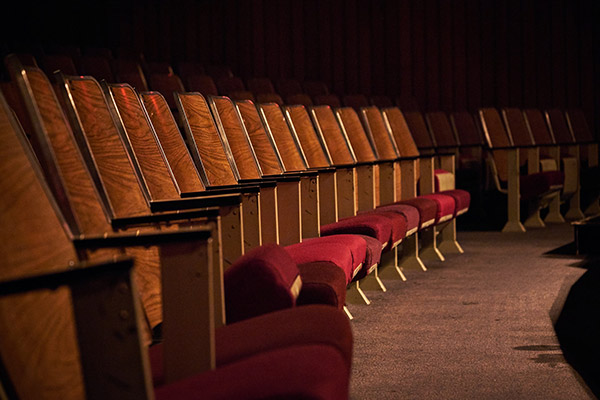Does music matter in the age of COVID?
Ardelle Ries - 17 July 2020

While the COVID-19 pandemic has left concert halls and auditoriums empty, it’s important to practice musicking—any activity related to musical performance—now, more than ever, says Augustana music professor Ardelle Ries. (Photo credit: Ludovic Migneault).
“Listen to the music…You can’t kill the music!” proclaims Jimmy, the protagonist in Margaret Atwood’s dystopian MaddAddam trilogy wherein a deadly pandemic nearly annihilates humankind. As COVID-19 now sweeps the globe, a silent spring has descended, but completely unlike that predicted by Rachel Carson in 1962. Prohibition of large-scale gatherings combined with physical distancing protocols has brought concerts, festivals and ensemble activities to an abrupt halt. For advocates of musicking (any activity related to musical performance) and especially communal musicking, this muted world is uncharted territory. With calendars wiped clean of customary musical activity, we may ask ourselves, “Does music matter in the Age of COVID?”
Since lockdown, and true to the words uttered by Atwood’s Jimmy, music is alive and ever-present as we see in news broadcasts, through live-streamed concerts and balcony serenades, virtual choirs and COVID parodies. Writings about the power of music in the Age of COVID appear around the world. A rather pleasant composition has been created based on specific musical pitches assigned to correspond to the physical shape of the virus itself.
Proven to be a dynamic force bridging continents, cultures and creeds, music brings communities together. A conduit to access a broad spectrum of emotions, music evokes a complex human response. Whether in acts of war or in times of peace, music affirms our individuality as well as our place within community.
Music has always been an adjunct to healing—from the Romans, who documented its benefits during the Plague of Justinian, up to 21st-century therapies. In ancient Greece, medical practices of Asclepius and Hippocrates maintained that music was necessary to intensify the harmonious connections between body, mind, community and the natural environment. In the Middle Ages, men and women petitioned God to end the Black Death by walking through plague-infested streets singing psalms and hymns.
While learning from the past, we try to imagine the new normal. For musicians, this means predicting when musical gatherings will resume. It is no coincidence that during the late Middle Ages, when communities were besieged by numerous outbreaks of the plague, astonishingly complex polyphonic choral works were composed, suggesting that ensemble singing continued unabated. During this 21st-century pandemic, it is thought that the risks which surround community music-making activities are substantial. Proven beneficial for health and well-being, it is now nearly incomprehensible that beloved musical pursuits could be considered life-threatening.
Without the possibility to attend a concert or sit with friends from week to week in an ensemble rehearsal, there have been convincing attempts to create suitable online substitutes. A vast array of digital concerts and virtual choir, band or orchestra projects have delighted viewers; however, it is reported that participating listeners and musicians still feel a profound sense of loss.
The phrase “silver lining” frequently surfaces these days in media and in personal conversations. Certainly, isolation encourages us to reassess lifestyles, habits and behaviours. If Socrates is correct, our lives should be worth living as never before. But what silver lining could possibly emerge for musicking from our current state of emergency? In what manner can we return to the very musical activities that have always served to engage, enlighten and empower a cohesive social structure?
It is abundantly clear that although COVID has challenged every facet of our lives and our way of thinking, music is a constant, universal and essential service for the soul.
At this moment in time, while nostalgic for joyous communal musicking, you are strongly encouraged to look away from the computer screen and balance your listening and watching with active musical participation. Take an online or private music lesson. Keep in regular contact with your friends in choirs, bands and orchestras. Play the instrument that has collected dust over the decades. Sing with your family. Sing with neighbours at a distance. Sing for yourself. Have faith that the music will never die.
Ardelle Ries, Music, Augustana Campus, University of Alberta. This column was originally published in the Camrose Booster on May 19, 2020.